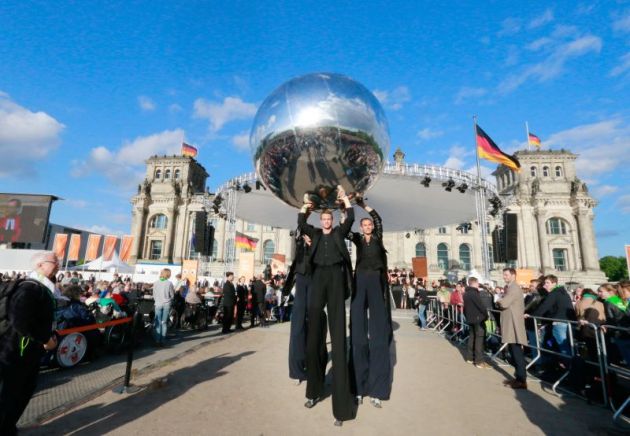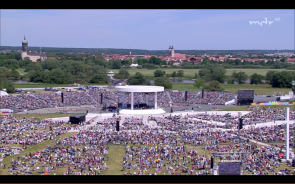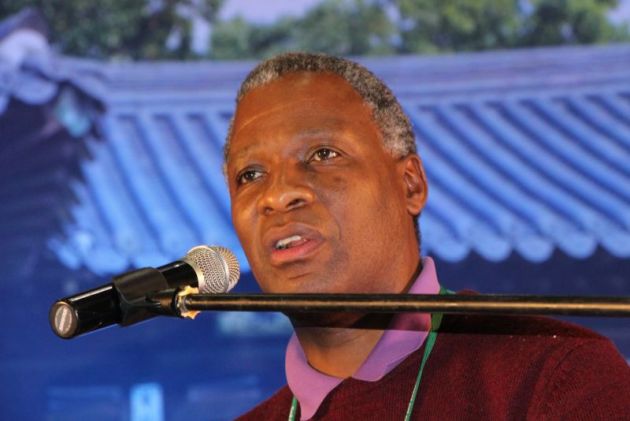South African archbishop preaches for a world of one humanity at Reformation ceremony

South African Archbishop Thabo Makgoba, speaking in Germany, has said the Reformation can become like a GPS system opening global awareness for the next 500 years and has called for a world of one humanity.
Makgoba, the Anglican archbishop of Cape Town was delivering the May 28 closing sermon of the bienial German Protestant Kirchentag, or "church festival," before tens of thousands of people on the banks of the river Elbe in the eastern German town of Wittenberg.
He stood a stone throw from the church where the 16th century Reformer Martin Luther set in motion the Reformation by nailing to Castle Church door in Wittenberg his 95 theses or charges against the Roman Catholic Church.
"The Reformation which he initiated was more than a theological watershed. It was a defining moment in our sociological and political evolution.
"But the Reformation is not something which concerns only our past. Interpreted in today's context, it can become our guide, our inspirational GPS, our global positioning system for the next 500 years.
Makgoba used Martin Luther's example and that of his name sake the American civil rights pastor Martin Luther King Jr. to share his own dream.
"I have a dream that one day soon all the narcissistic, nationalist, isolationist ramblings of our current times will disappear. I have a dream that instead there will arise a global awareness that we are of one humanity," said the South African archbishop, a successor of Desmond Tutu.
He delivering the sermon at the end of the bi-annual Kirchentag held in Berlin and Wittenberg.
It the start of a summer of commemorating 500 years of Reformation, shared also with the Catholic Church from which it caused a schism and hundreds of years of conflict and tension in Europe and other parts of the world.
Makgoba said of Luther's example "He was one of the true fathers of democratic freedom. He mobilized millions, in an unstoppable movement, to embrace the right to participate. He was the architect of the social conscience. He made it safe to want to be part of something bigger than ourselves."
Referring to apartheid South Africa and Nazi Germany, Makgoba said: "Our histories of our two countries – South Africa and Germany - are records of unspeakable cruelty but they are also histories of God's unfailing faithfulness and the challenge to find the Holy One"
STORY OF HAGAR
His sermon was based on the biblical story of Hagar, in the Story of Genesis, an account he said "For any African, Hagar's story is deeply etched into both our historical DNA and our contemporary experience."
"Just like the Syrian refugees you have welcomed into Germany, Hagar stands as a beacon of hope to all who suffer, to the oppressed around the world. She stands with refugees and migrants, with those who are trafficked across oceans in our 21st-century slave trade. To be seen by God is to know that we and they are not forgotten."

Makgoba said it was not possible to be a pilgrim on German soil withoout carrying "deep gratitude for the courage of people of faith in the dark days of the Nazi regime; for the church of Dietrich Bonhoeffer and Franz Rheinish, the church of women and men who refused to take oaths of allegiance to Hitler's state; for those who forged false documents that allowed Jews and Romany peoples to escape the pogroms of Europe.
"No one who has lived through the yoke of oppression and cruelty, as I have, although on another continent and through another era, can view lightly the faith and courage that it needed to stand up to your particular system of oppression and cruelty."
Makgoba ended with a special call to the young people who attended the Kirchentag.
"As you live the Kirchentag, I charge you to hear the cries of others and of our planet as God would.
"Even if you feel that you are seeing the challenges only dimly, only obscurely, please do something, at least one thing, for love's sake, dignity's sake, for freedom's sake, for Christ's sake. In the 21st century, we can do better, we must do better for ourselves and our neighbors."
Makgoba ended his sermon with the words: "I have a dream that your children, and mine, will one day live in an Africa and in a world that has an abundance of unlimited and equal access to education, to health care, to water and sanitation and to economic opportunities."
After he had delivered his sermon the song of the civil rights movement from the sixties – "We shall overcome" was sung by the many thousands gathered.
The May 24-28 Berlin and Wittenberg Kirchentag festivities opened with three sermons in central Berlin, followed the second day by a high-profile discussion between Chancellor Angela Merkel, herself the daughter of a Lutheran pastor and former U.S. president Barack Obama.
